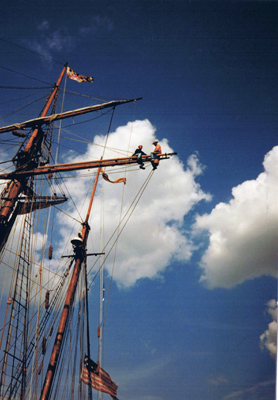Sailing as the new M.B.A.
Growing up on Cape Cod, Crane Stookey ’76 loved wooden boats and sailing. After a career on land (as an architect) he returned to the sea—as a tall-ship officer and founder of a sailing school.

Many ships he crewed were training ships, on which young people learn to sail while studying science. Stookey enjoyed the teaching as much as the sailing, so he established The Nova Scotia Sea School in 1994. “The Sea School was never about teaching people how to sail,” he says. “It was about teaching people how to grow up well, how to take command of the boat and their lives.”
The Sea School won a Queen’s Golden Jubilee Medal in 2003. Stookey left its helm in 2006 to make yet another career change, to executive leadership coaching. His interests in coaching and sailing merged in his 2012 book Keep Your People in the Boat: Workforce Engagement Lessons from the Sea.
Stookey’s Leadership Lessons from the Sea
The situation is the best teacher. In The Nova Scotia Sea School, 13 people live for 21 days in a boat with no cabin. They sleep across the oars, laying oars side by side and spreading sleeping pads and bags on top. The gear is under the oars, so once the sleeping bags are rolled out, no one can get at anything without everyone getting up and moving the oars. Stookey says this generates teamwork faster and more effectively than any leader’s guidance or admonition.
Leadership is a practice of generosity. A young woman with little experience had to tack the boat (change its direction) in the middle of the night, and the only command she gave was “Places, everyone.” Her equally novice crew members lined up and wordlessly tacked the boat perfectly. The crew wanted to be trusted, and she trusted them liberally, which gave them the confidence to do the job.
Leaders cultivate leaders. Stookey’s captain was out in a small boat with some passengers when the engine died and the boat began drifting out to the open ocean. Suddenly in charge of the ship, Stookey wanted to call the Coast Guard, but a crew member had the idea to rescue them using a kayak. Stookey was skeptical, but the crew won him over. The crew member tied himself to a lead and launched himself into the ocean. He saved the people’s lives.
Give people what they need, don’t give them what they don’t need, and know the difference. Young crew members at The Nova Scotia Sea School would often bicker and complain. Stookey and the other leaders would sit back and let a voice of calm and compromise emerge from the group. Stepping in would have risked stealing away the crew’s self-reliance, Stookey says, creating a situation where the crew looked to the leaders for solutions instead of to themselves.